BUMGT5980 - Managerial Decision Making: Bias Concepts & Cases
VerifiedAdded on 2023/06/03
|17
|4870
|284
Essay
AI Summary
This assignment provides an in-depth analysis of managerial decision-making, focusing on biases explained through concepts like bounded rationality, objective rationality, and systems thinking, referencing Simon's work. Part A critically examines these concepts, while Part B applies them to specific decision-making scenarios, detailing bias recognition, measurement, and strategies to overcome them. The analysis incorporates real-world examples and explores the cognitive and psychological factors influencing decision-making processes, offering insights into improving decision quality and mitigating the impact of biases. The document is available on Desklib, a platform offering a wealth of study resources for students.

Running head: MANAGERIAL DECISION MAKING
Essay and case study analysis on Managerial decision making
Name of the student:
Name of the university:
Author note:
Essay and case study analysis on Managerial decision making
Name of the student:
Name of the university:
Author note:
Paraphrase This Document
Need a fresh take? Get an instant paraphrase of this document with our AI Paraphraser
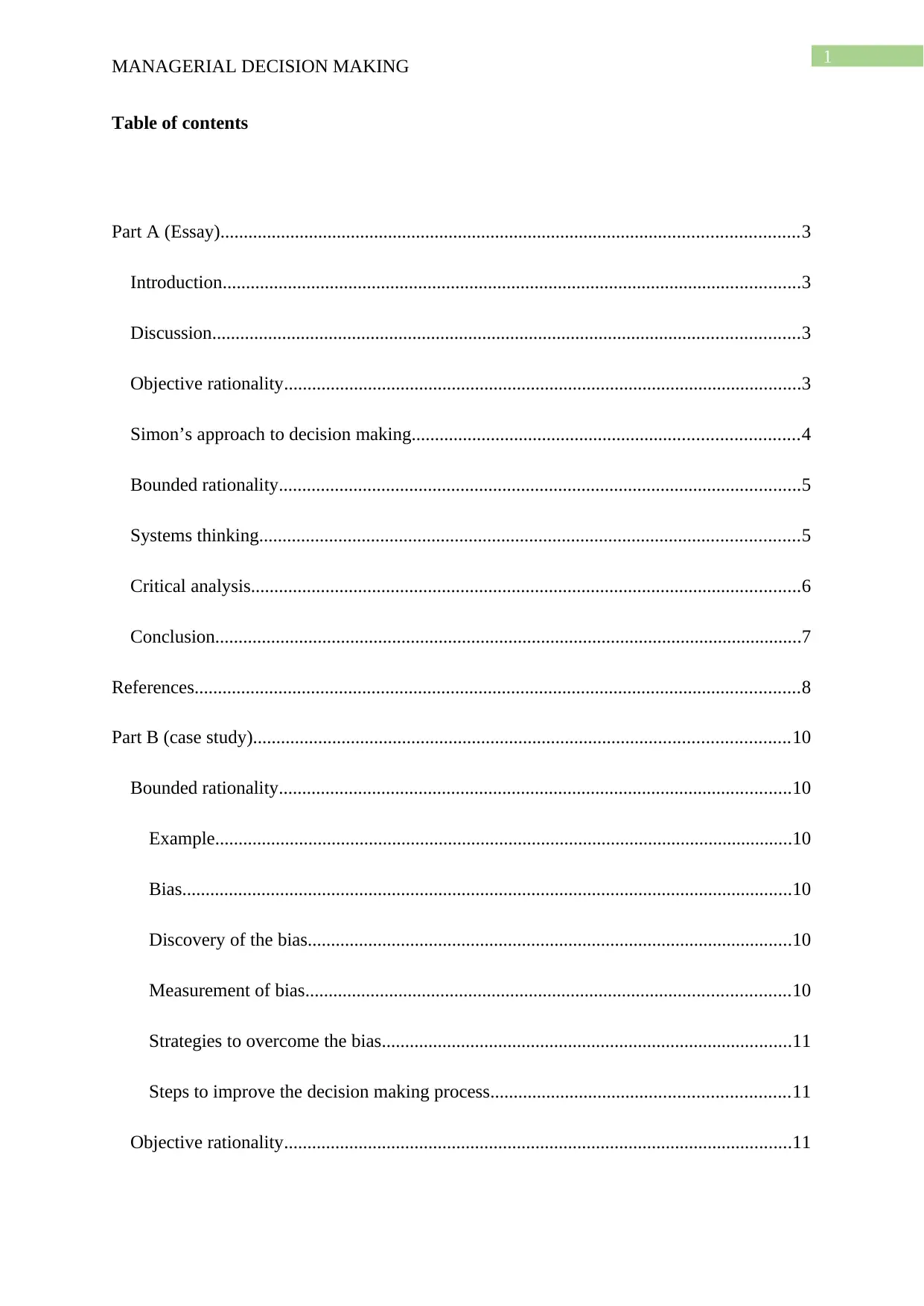
1
MANAGERIAL DECISION MAKING
Table of contents
Part A (Essay)............................................................................................................................3
Introduction............................................................................................................................3
Discussion..............................................................................................................................3
Objective rationality...............................................................................................................3
Simon’s approach to decision making...................................................................................4
Bounded rationality................................................................................................................5
Systems thinking....................................................................................................................5
Critical analysis......................................................................................................................6
Conclusion..............................................................................................................................7
References..................................................................................................................................8
Part B (case study)...................................................................................................................10
Bounded rationality..............................................................................................................10
Example............................................................................................................................10
Bias...................................................................................................................................10
Discovery of the bias........................................................................................................10
Measurement of bias........................................................................................................10
Strategies to overcome the bias........................................................................................11
Steps to improve the decision making process................................................................11
Objective rationality.............................................................................................................11
MANAGERIAL DECISION MAKING
Table of contents
Part A (Essay)............................................................................................................................3
Introduction............................................................................................................................3
Discussion..............................................................................................................................3
Objective rationality...............................................................................................................3
Simon’s approach to decision making...................................................................................4
Bounded rationality................................................................................................................5
Systems thinking....................................................................................................................5
Critical analysis......................................................................................................................6
Conclusion..............................................................................................................................7
References..................................................................................................................................8
Part B (case study)...................................................................................................................10
Bounded rationality..............................................................................................................10
Example............................................................................................................................10
Bias...................................................................................................................................10
Discovery of the bias........................................................................................................10
Measurement of bias........................................................................................................10
Strategies to overcome the bias........................................................................................11
Steps to improve the decision making process................................................................11
Objective rationality.............................................................................................................11
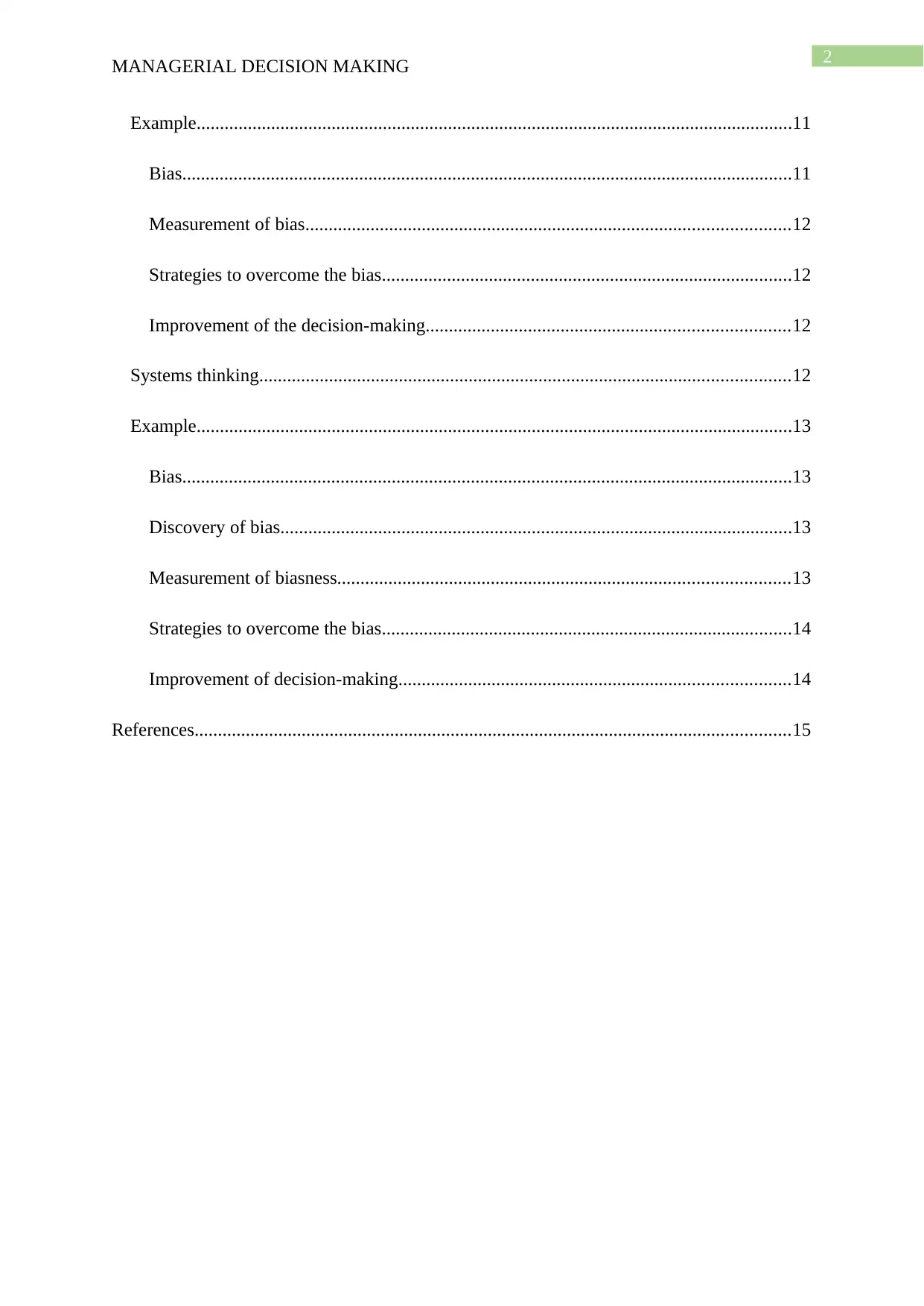
2
MANAGERIAL DECISION MAKING
Example................................................................................................................................11
Bias...................................................................................................................................11
Measurement of bias........................................................................................................12
Strategies to overcome the bias........................................................................................12
Improvement of the decision-making..............................................................................12
Systems thinking..................................................................................................................12
Example................................................................................................................................13
Bias...................................................................................................................................13
Discovery of bias..............................................................................................................13
Measurement of biasness.................................................................................................13
Strategies to overcome the bias........................................................................................14
Improvement of decision-making....................................................................................14
References................................................................................................................................15
MANAGERIAL DECISION MAKING
Example................................................................................................................................11
Bias...................................................................................................................................11
Measurement of bias........................................................................................................12
Strategies to overcome the bias........................................................................................12
Improvement of the decision-making..............................................................................12
Systems thinking..................................................................................................................12
Example................................................................................................................................13
Bias...................................................................................................................................13
Discovery of bias..............................................................................................................13
Measurement of biasness.................................................................................................13
Strategies to overcome the bias........................................................................................14
Improvement of decision-making....................................................................................14
References................................................................................................................................15
⊘ This is a preview!⊘
Do you want full access?
Subscribe today to unlock all pages.

Trusted by 1+ million students worldwide
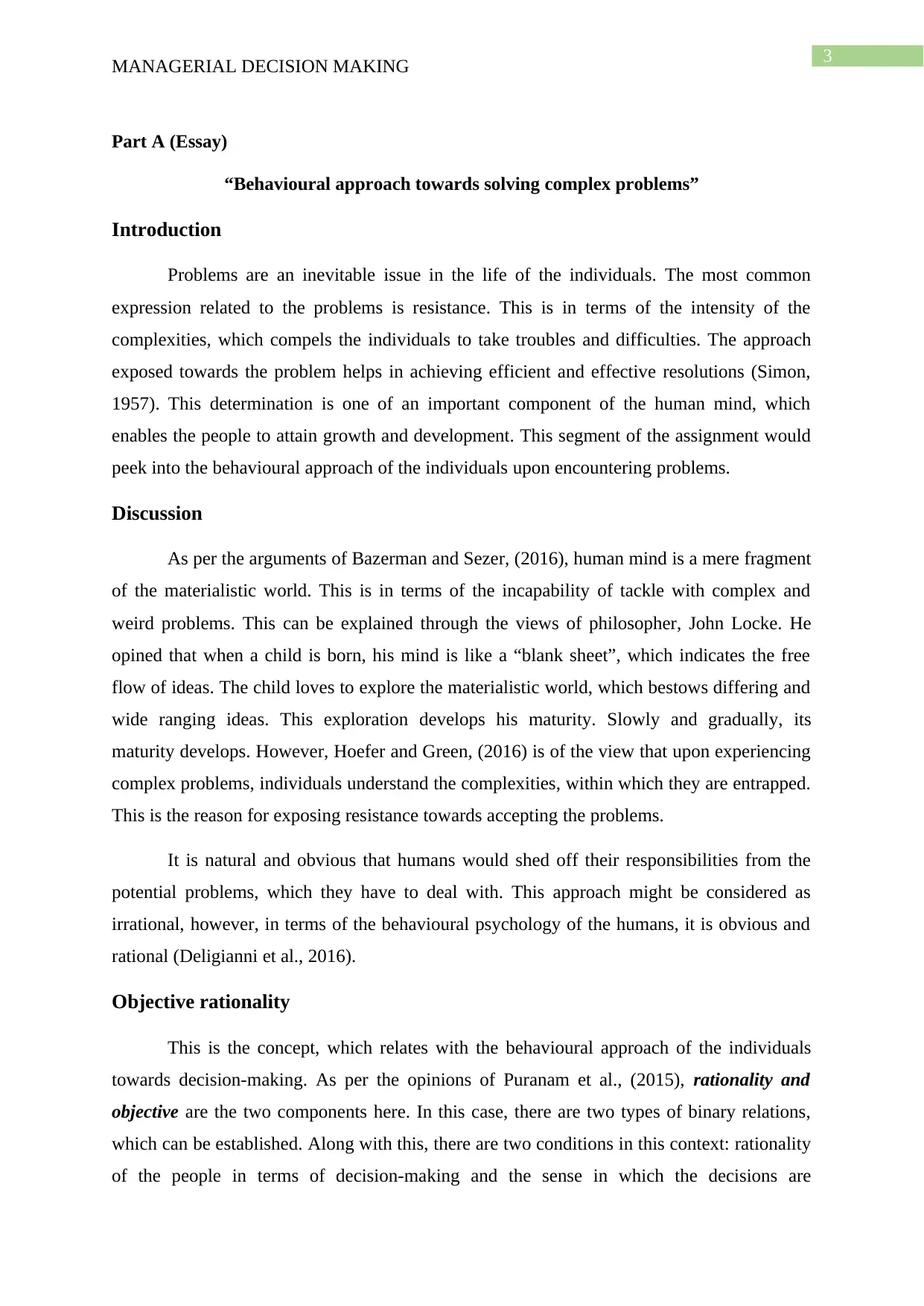
3
MANAGERIAL DECISION MAKING
Part A (Essay)
“Behavioural approach towards solving complex problems”
Introduction
Problems are an inevitable issue in the life of the individuals. The most common
expression related to the problems is resistance. This is in terms of the intensity of the
complexities, which compels the individuals to take troubles and difficulties. The approach
exposed towards the problem helps in achieving efficient and effective resolutions (Simon,
1957). This determination is one of an important component of the human mind, which
enables the people to attain growth and development. This segment of the assignment would
peek into the behavioural approach of the individuals upon encountering problems.
Discussion
As per the arguments of Bazerman and Sezer, (2016), human mind is a mere fragment
of the materialistic world. This is in terms of the incapability of tackle with complex and
weird problems. This can be explained through the views of philosopher, John Locke. He
opined that when a child is born, his mind is like a “blank sheet”, which indicates the free
flow of ideas. The child loves to explore the materialistic world, which bestows differing and
wide ranging ideas. This exploration develops his maturity. Slowly and gradually, its
maturity develops. However, Hoefer and Green, (2016) is of the view that upon experiencing
complex problems, individuals understand the complexities, within which they are entrapped.
This is the reason for exposing resistance towards accepting the problems.
It is natural and obvious that humans would shed off their responsibilities from the
potential problems, which they have to deal with. This approach might be considered as
irrational, however, in terms of the behavioural psychology of the humans, it is obvious and
rational (Deligianni et al., 2016).
Objective rationality
This is the concept, which relates with the behavioural approach of the individuals
towards decision-making. As per the opinions of Puranam et al., (2015), rationality and
objective are the two components here. In this case, there are two types of binary relations,
which can be established. Along with this, there are two conditions in this context: rationality
of the people in terms of decision-making and the sense in which the decisions are
MANAGERIAL DECISION MAKING
Part A (Essay)
“Behavioural approach towards solving complex problems”
Introduction
Problems are an inevitable issue in the life of the individuals. The most common
expression related to the problems is resistance. This is in terms of the intensity of the
complexities, which compels the individuals to take troubles and difficulties. The approach
exposed towards the problem helps in achieving efficient and effective resolutions (Simon,
1957). This determination is one of an important component of the human mind, which
enables the people to attain growth and development. This segment of the assignment would
peek into the behavioural approach of the individuals upon encountering problems.
Discussion
As per the arguments of Bazerman and Sezer, (2016), human mind is a mere fragment
of the materialistic world. This is in terms of the incapability of tackle with complex and
weird problems. This can be explained through the views of philosopher, John Locke. He
opined that when a child is born, his mind is like a “blank sheet”, which indicates the free
flow of ideas. The child loves to explore the materialistic world, which bestows differing and
wide ranging ideas. This exploration develops his maturity. Slowly and gradually, its
maturity develops. However, Hoefer and Green, (2016) is of the view that upon experiencing
complex problems, individuals understand the complexities, within which they are entrapped.
This is the reason for exposing resistance towards accepting the problems.
It is natural and obvious that humans would shed off their responsibilities from the
potential problems, which they have to deal with. This approach might be considered as
irrational, however, in terms of the behavioural psychology of the humans, it is obvious and
rational (Deligianni et al., 2016).
Objective rationality
This is the concept, which relates with the behavioural approach of the individuals
towards decision-making. As per the opinions of Puranam et al., (2015), rationality and
objective are the two components here. In this case, there are two types of binary relations,
which can be established. Along with this, there are two conditions in this context: rationality
of the people in terms of decision-making and the sense in which the decisions are
Paraphrase This Document
Need a fresh take? Get an instant paraphrase of this document with our AI Paraphraser
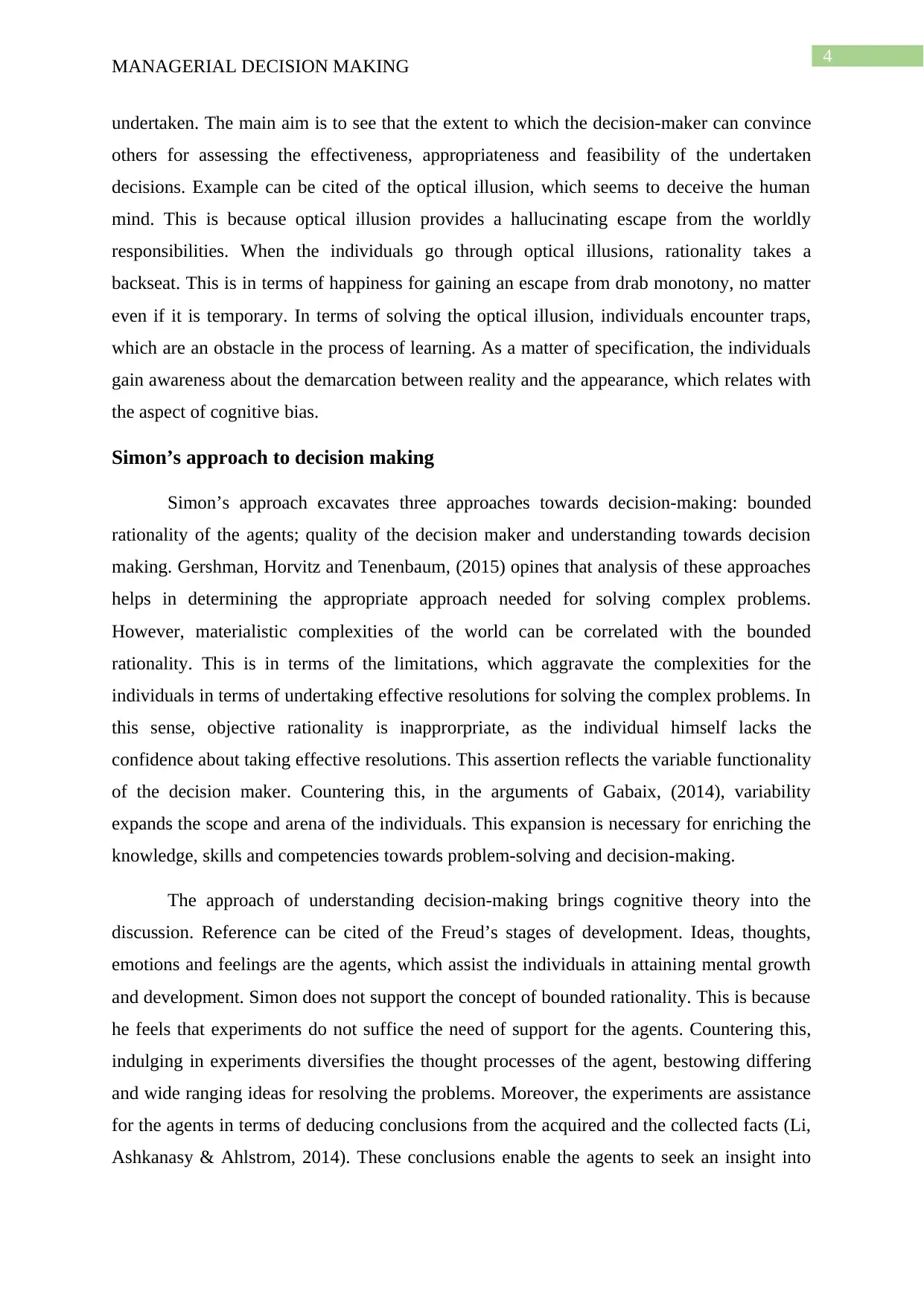
4
MANAGERIAL DECISION MAKING
undertaken. The main aim is to see that the extent to which the decision-maker can convince
others for assessing the effectiveness, appropriateness and feasibility of the undertaken
decisions. Example can be cited of the optical illusion, which seems to deceive the human
mind. This is because optical illusion provides a hallucinating escape from the worldly
responsibilities. When the individuals go through optical illusions, rationality takes a
backseat. This is in terms of happiness for gaining an escape from drab monotony, no matter
even if it is temporary. In terms of solving the optical illusion, individuals encounter traps,
which are an obstacle in the process of learning. As a matter of specification, the individuals
gain awareness about the demarcation between reality and the appearance, which relates with
the aspect of cognitive bias.
Simon’s approach to decision making
Simon’s approach excavates three approaches towards decision-making: bounded
rationality of the agents; quality of the decision maker and understanding towards decision
making. Gershman, Horvitz and Tenenbaum, (2015) opines that analysis of these approaches
helps in determining the appropriate approach needed for solving complex problems.
However, materialistic complexities of the world can be correlated with the bounded
rationality. This is in terms of the limitations, which aggravate the complexities for the
individuals in terms of undertaking effective resolutions for solving the complex problems. In
this sense, objective rationality is inapprorpriate, as the individual himself lacks the
confidence about taking effective resolutions. This assertion reflects the variable functionality
of the decision maker. Countering this, in the arguments of Gabaix, (2014), variability
expands the scope and arena of the individuals. This expansion is necessary for enriching the
knowledge, skills and competencies towards problem-solving and decision-making.
The approach of understanding decision-making brings cognitive theory into the
discussion. Reference can be cited of the Freud’s stages of development. Ideas, thoughts,
emotions and feelings are the agents, which assist the individuals in attaining mental growth
and development. Simon does not support the concept of bounded rationality. This is because
he feels that experiments do not suffice the need of support for the agents. Countering this,
indulging in experiments diversifies the thought processes of the agent, bestowing differing
and wide ranging ideas for resolving the problems. Moreover, the experiments are assistance
for the agents in terms of deducing conclusions from the acquired and the collected facts (Li,
Ashkanasy & Ahlstrom, 2014). These conclusions enable the agents to seek an insight into
MANAGERIAL DECISION MAKING
undertaken. The main aim is to see that the extent to which the decision-maker can convince
others for assessing the effectiveness, appropriateness and feasibility of the undertaken
decisions. Example can be cited of the optical illusion, which seems to deceive the human
mind. This is because optical illusion provides a hallucinating escape from the worldly
responsibilities. When the individuals go through optical illusions, rationality takes a
backseat. This is in terms of happiness for gaining an escape from drab monotony, no matter
even if it is temporary. In terms of solving the optical illusion, individuals encounter traps,
which are an obstacle in the process of learning. As a matter of specification, the individuals
gain awareness about the demarcation between reality and the appearance, which relates with
the aspect of cognitive bias.
Simon’s approach to decision making
Simon’s approach excavates three approaches towards decision-making: bounded
rationality of the agents; quality of the decision maker and understanding towards decision
making. Gershman, Horvitz and Tenenbaum, (2015) opines that analysis of these approaches
helps in determining the appropriate approach needed for solving complex problems.
However, materialistic complexities of the world can be correlated with the bounded
rationality. This is in terms of the limitations, which aggravate the complexities for the
individuals in terms of undertaking effective resolutions for solving the complex problems. In
this sense, objective rationality is inapprorpriate, as the individual himself lacks the
confidence about taking effective resolutions. This assertion reflects the variable functionality
of the decision maker. Countering this, in the arguments of Gabaix, (2014), variability
expands the scope and arena of the individuals. This expansion is necessary for enriching the
knowledge, skills and competencies towards problem-solving and decision-making.
The approach of understanding decision-making brings cognitive theory into the
discussion. Reference can be cited of the Freud’s stages of development. Ideas, thoughts,
emotions and feelings are the agents, which assist the individuals in attaining mental growth
and development. Simon does not support the concept of bounded rationality. This is because
he feels that experiments do not suffice the need of support for the agents. Countering this,
indulging in experiments diversifies the thought processes of the agent, bestowing differing
and wide ranging ideas for resolving the problems. Moreover, the experiments are assistance
for the agents in terms of deducing conclusions from the acquired and the collected facts (Li,
Ashkanasy & Ahlstrom, 2014). These conclusions enable the agents to seek an insight into
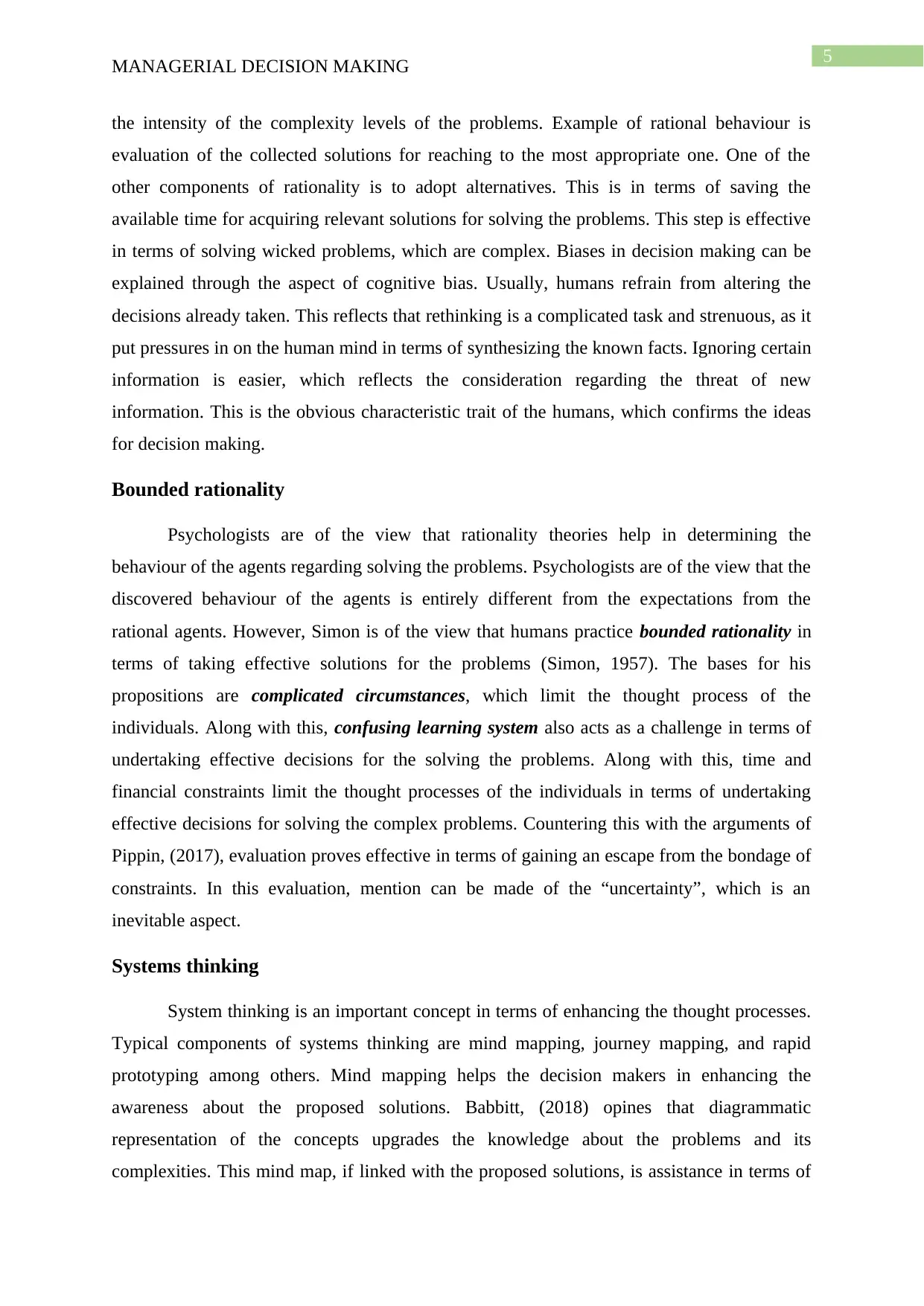
5
MANAGERIAL DECISION MAKING
the intensity of the complexity levels of the problems. Example of rational behaviour is
evaluation of the collected solutions for reaching to the most appropriate one. One of the
other components of rationality is to adopt alternatives. This is in terms of saving the
available time for acquiring relevant solutions for solving the problems. This step is effective
in terms of solving wicked problems, which are complex. Biases in decision making can be
explained through the aspect of cognitive bias. Usually, humans refrain from altering the
decisions already taken. This reflects that rethinking is a complicated task and strenuous, as it
put pressures in on the human mind in terms of synthesizing the known facts. Ignoring certain
information is easier, which reflects the consideration regarding the threat of new
information. This is the obvious characteristic trait of the humans, which confirms the ideas
for decision making.
Bounded rationality
Psychologists are of the view that rationality theories help in determining the
behaviour of the agents regarding solving the problems. Psychologists are of the view that the
discovered behaviour of the agents is entirely different from the expectations from the
rational agents. However, Simon is of the view that humans practice bounded rationality in
terms of taking effective solutions for the problems (Simon, 1957). The bases for his
propositions are complicated circumstances, which limit the thought process of the
individuals. Along with this, confusing learning system also acts as a challenge in terms of
undertaking effective decisions for the solving the problems. Along with this, time and
financial constraints limit the thought processes of the individuals in terms of undertaking
effective decisions for solving the complex problems. Countering this with the arguments of
Pippin, (2017), evaluation proves effective in terms of gaining an escape from the bondage of
constraints. In this evaluation, mention can be made of the “uncertainty”, which is an
inevitable aspect.
Systems thinking
System thinking is an important concept in terms of enhancing the thought processes.
Typical components of systems thinking are mind mapping, journey mapping, and rapid
prototyping among others. Mind mapping helps the decision makers in enhancing the
awareness about the proposed solutions. Babbitt, (2018) opines that diagrammatic
representation of the concepts upgrades the knowledge about the problems and its
complexities. This mind map, if linked with the proposed solutions, is assistance in terms of
MANAGERIAL DECISION MAKING
the intensity of the complexity levels of the problems. Example of rational behaviour is
evaluation of the collected solutions for reaching to the most appropriate one. One of the
other components of rationality is to adopt alternatives. This is in terms of saving the
available time for acquiring relevant solutions for solving the problems. This step is effective
in terms of solving wicked problems, which are complex. Biases in decision making can be
explained through the aspect of cognitive bias. Usually, humans refrain from altering the
decisions already taken. This reflects that rethinking is a complicated task and strenuous, as it
put pressures in on the human mind in terms of synthesizing the known facts. Ignoring certain
information is easier, which reflects the consideration regarding the threat of new
information. This is the obvious characteristic trait of the humans, which confirms the ideas
for decision making.
Bounded rationality
Psychologists are of the view that rationality theories help in determining the
behaviour of the agents regarding solving the problems. Psychologists are of the view that the
discovered behaviour of the agents is entirely different from the expectations from the
rational agents. However, Simon is of the view that humans practice bounded rationality in
terms of taking effective solutions for the problems (Simon, 1957). The bases for his
propositions are complicated circumstances, which limit the thought process of the
individuals. Along with this, confusing learning system also acts as a challenge in terms of
undertaking effective decisions for the solving the problems. Along with this, time and
financial constraints limit the thought processes of the individuals in terms of undertaking
effective decisions for solving the complex problems. Countering this with the arguments of
Pippin, (2017), evaluation proves effective in terms of gaining an escape from the bondage of
constraints. In this evaluation, mention can be made of the “uncertainty”, which is an
inevitable aspect.
Systems thinking
System thinking is an important concept in terms of enhancing the thought processes.
Typical components of systems thinking are mind mapping, journey mapping, and rapid
prototyping among others. Mind mapping helps the decision makers in enhancing the
awareness about the proposed solutions. Babbitt, (2018) opines that diagrammatic
representation of the concepts upgrades the knowledge about the problems and its
complexities. This mind map, if linked with the proposed solutions, is assistance in terms of
⊘ This is a preview!⊘
Do you want full access?
Subscribe today to unlock all pages.

Trusted by 1+ million students worldwide
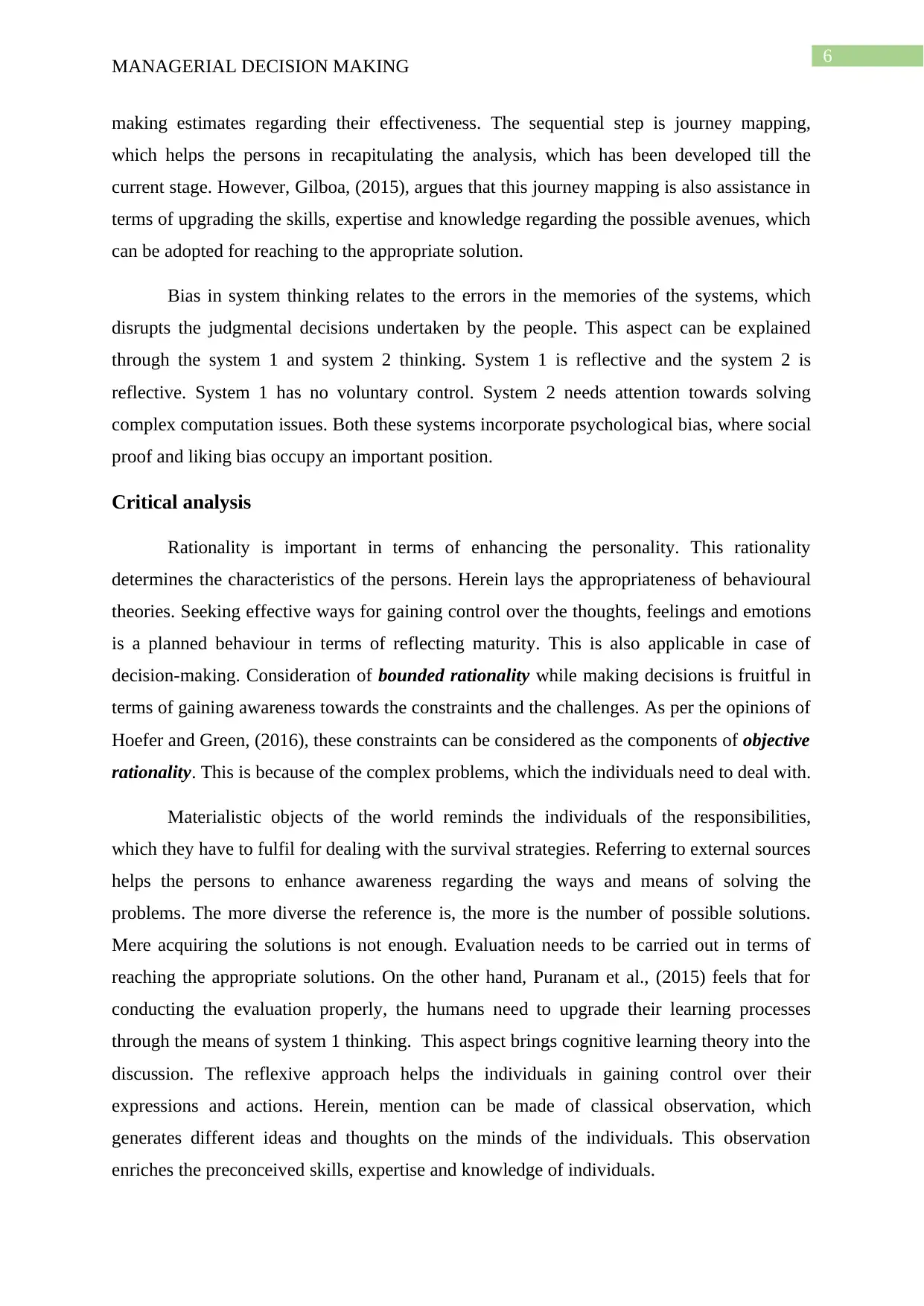
6
MANAGERIAL DECISION MAKING
making estimates regarding their effectiveness. The sequential step is journey mapping,
which helps the persons in recapitulating the analysis, which has been developed till the
current stage. However, Gilboa, (2015), argues that this journey mapping is also assistance in
terms of upgrading the skills, expertise and knowledge regarding the possible avenues, which
can be adopted for reaching to the appropriate solution.
Bias in system thinking relates to the errors in the memories of the systems, which
disrupts the judgmental decisions undertaken by the people. This aspect can be explained
through the system 1 and system 2 thinking. System 1 is reflective and the system 2 is
reflective. System 1 has no voluntary control. System 2 needs attention towards solving
complex computation issues. Both these systems incorporate psychological bias, where social
proof and liking bias occupy an important position.
Critical analysis
Rationality is important in terms of enhancing the personality. This rationality
determines the characteristics of the persons. Herein lays the appropriateness of behavioural
theories. Seeking effective ways for gaining control over the thoughts, feelings and emotions
is a planned behaviour in terms of reflecting maturity. This is also applicable in case of
decision-making. Consideration of bounded rationality while making decisions is fruitful in
terms of gaining awareness towards the constraints and the challenges. As per the opinions of
Hoefer and Green, (2016), these constraints can be considered as the components of objective
rationality. This is because of the complex problems, which the individuals need to deal with.
Materialistic objects of the world reminds the individuals of the responsibilities,
which they have to fulfil for dealing with the survival strategies. Referring to external sources
helps the persons to enhance awareness regarding the ways and means of solving the
problems. The more diverse the reference is, the more is the number of possible solutions.
Mere acquiring the solutions is not enough. Evaluation needs to be carried out in terms of
reaching the appropriate solutions. On the other hand, Puranam et al., (2015) feels that for
conducting the evaluation properly, the humans need to upgrade their learning processes
through the means of system 1 thinking. This aspect brings cognitive learning theory into the
discussion. The reflexive approach helps the individuals in gaining control over their
expressions and actions. Herein, mention can be made of classical observation, which
generates different ideas and thoughts on the minds of the individuals. This observation
enriches the preconceived skills, expertise and knowledge of individuals.
MANAGERIAL DECISION MAKING
making estimates regarding their effectiveness. The sequential step is journey mapping,
which helps the persons in recapitulating the analysis, which has been developed till the
current stage. However, Gilboa, (2015), argues that this journey mapping is also assistance in
terms of upgrading the skills, expertise and knowledge regarding the possible avenues, which
can be adopted for reaching to the appropriate solution.
Bias in system thinking relates to the errors in the memories of the systems, which
disrupts the judgmental decisions undertaken by the people. This aspect can be explained
through the system 1 and system 2 thinking. System 1 is reflective and the system 2 is
reflective. System 1 has no voluntary control. System 2 needs attention towards solving
complex computation issues. Both these systems incorporate psychological bias, where social
proof and liking bias occupy an important position.
Critical analysis
Rationality is important in terms of enhancing the personality. This rationality
determines the characteristics of the persons. Herein lays the appropriateness of behavioural
theories. Seeking effective ways for gaining control over the thoughts, feelings and emotions
is a planned behaviour in terms of reflecting maturity. This is also applicable in case of
decision-making. Consideration of bounded rationality while making decisions is fruitful in
terms of gaining awareness towards the constraints and the challenges. As per the opinions of
Hoefer and Green, (2016), these constraints can be considered as the components of objective
rationality. This is because of the complex problems, which the individuals need to deal with.
Materialistic objects of the world reminds the individuals of the responsibilities,
which they have to fulfil for dealing with the survival strategies. Referring to external sources
helps the persons to enhance awareness regarding the ways and means of solving the
problems. The more diverse the reference is, the more is the number of possible solutions.
Mere acquiring the solutions is not enough. Evaluation needs to be carried out in terms of
reaching the appropriate solutions. On the other hand, Puranam et al., (2015) feels that for
conducting the evaluation properly, the humans need to upgrade their learning processes
through the means of system 1 thinking. This aspect brings cognitive learning theory into the
discussion. The reflexive approach helps the individuals in gaining control over their
expressions and actions. Herein, mention can be made of classical observation, which
generates different ideas and thoughts on the minds of the individuals. This observation
enriches the preconceived skills, expertise and knowledge of individuals.
Paraphrase This Document
Need a fresh take? Get an instant paraphrase of this document with our AI Paraphraser
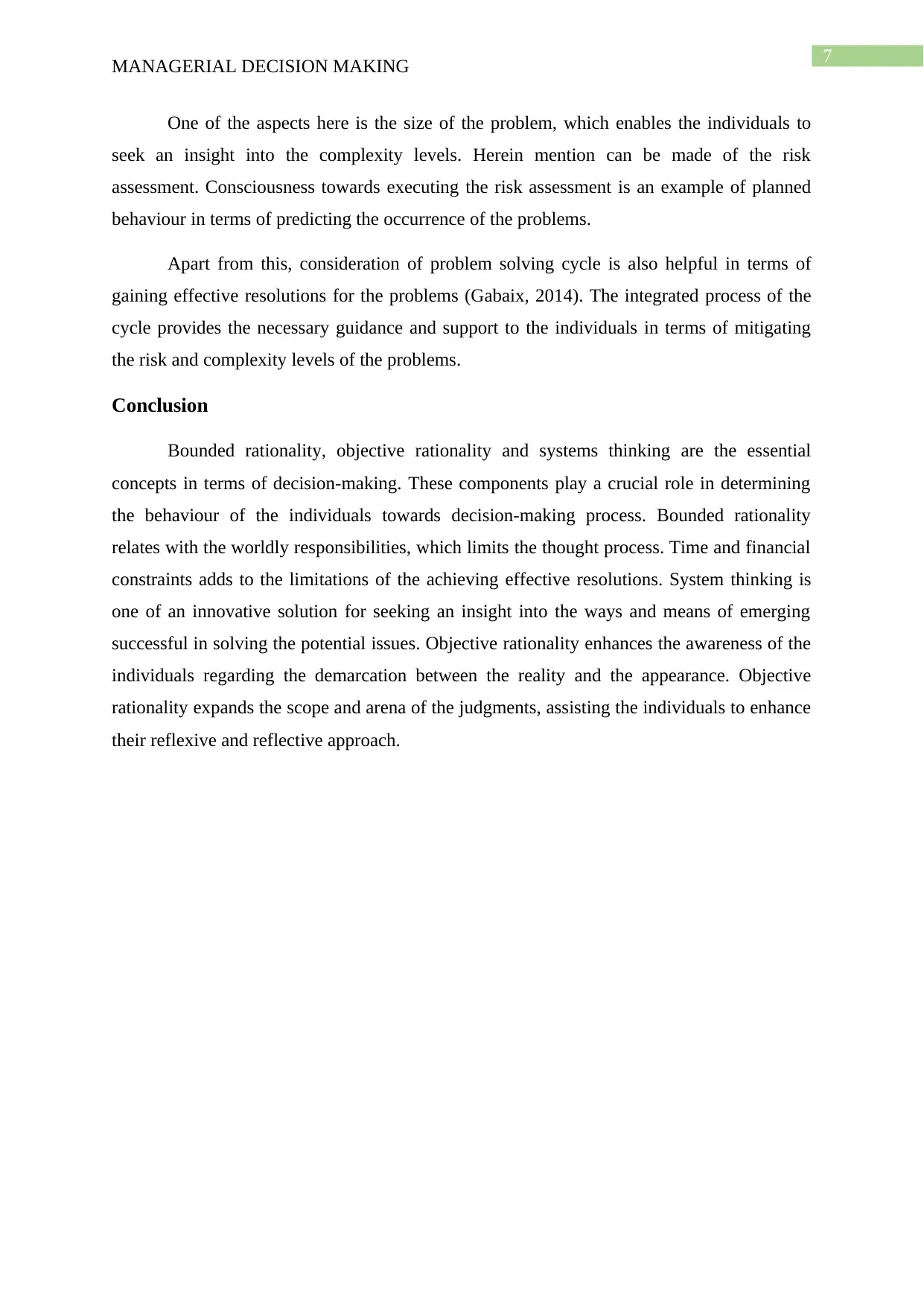
7
MANAGERIAL DECISION MAKING
One of the aspects here is the size of the problem, which enables the individuals to
seek an insight into the complexity levels. Herein mention can be made of the risk
assessment. Consciousness towards executing the risk assessment is an example of planned
behaviour in terms of predicting the occurrence of the problems.
Apart from this, consideration of problem solving cycle is also helpful in terms of
gaining effective resolutions for the problems (Gabaix, 2014). The integrated process of the
cycle provides the necessary guidance and support to the individuals in terms of mitigating
the risk and complexity levels of the problems.
Conclusion
Bounded rationality, objective rationality and systems thinking are the essential
concepts in terms of decision-making. These components play a crucial role in determining
the behaviour of the individuals towards decision-making process. Bounded rationality
relates with the worldly responsibilities, which limits the thought process. Time and financial
constraints adds to the limitations of the achieving effective resolutions. System thinking is
one of an innovative solution for seeking an insight into the ways and means of emerging
successful in solving the potential issues. Objective rationality enhances the awareness of the
individuals regarding the demarcation between the reality and the appearance. Objective
rationality expands the scope and arena of the judgments, assisting the individuals to enhance
their reflexive and reflective approach.
MANAGERIAL DECISION MAKING
One of the aspects here is the size of the problem, which enables the individuals to
seek an insight into the complexity levels. Herein mention can be made of the risk
assessment. Consciousness towards executing the risk assessment is an example of planned
behaviour in terms of predicting the occurrence of the problems.
Apart from this, consideration of problem solving cycle is also helpful in terms of
gaining effective resolutions for the problems (Gabaix, 2014). The integrated process of the
cycle provides the necessary guidance and support to the individuals in terms of mitigating
the risk and complexity levels of the problems.
Conclusion
Bounded rationality, objective rationality and systems thinking are the essential
concepts in terms of decision-making. These components play a crucial role in determining
the behaviour of the individuals towards decision-making process. Bounded rationality
relates with the worldly responsibilities, which limits the thought process. Time and financial
constraints adds to the limitations of the achieving effective resolutions. System thinking is
one of an innovative solution for seeking an insight into the ways and means of emerging
successful in solving the potential issues. Objective rationality enhances the awareness of the
individuals regarding the demarcation between the reality and the appearance. Objective
rationality expands the scope and arena of the judgments, assisting the individuals to enhance
their reflexive and reflective approach.
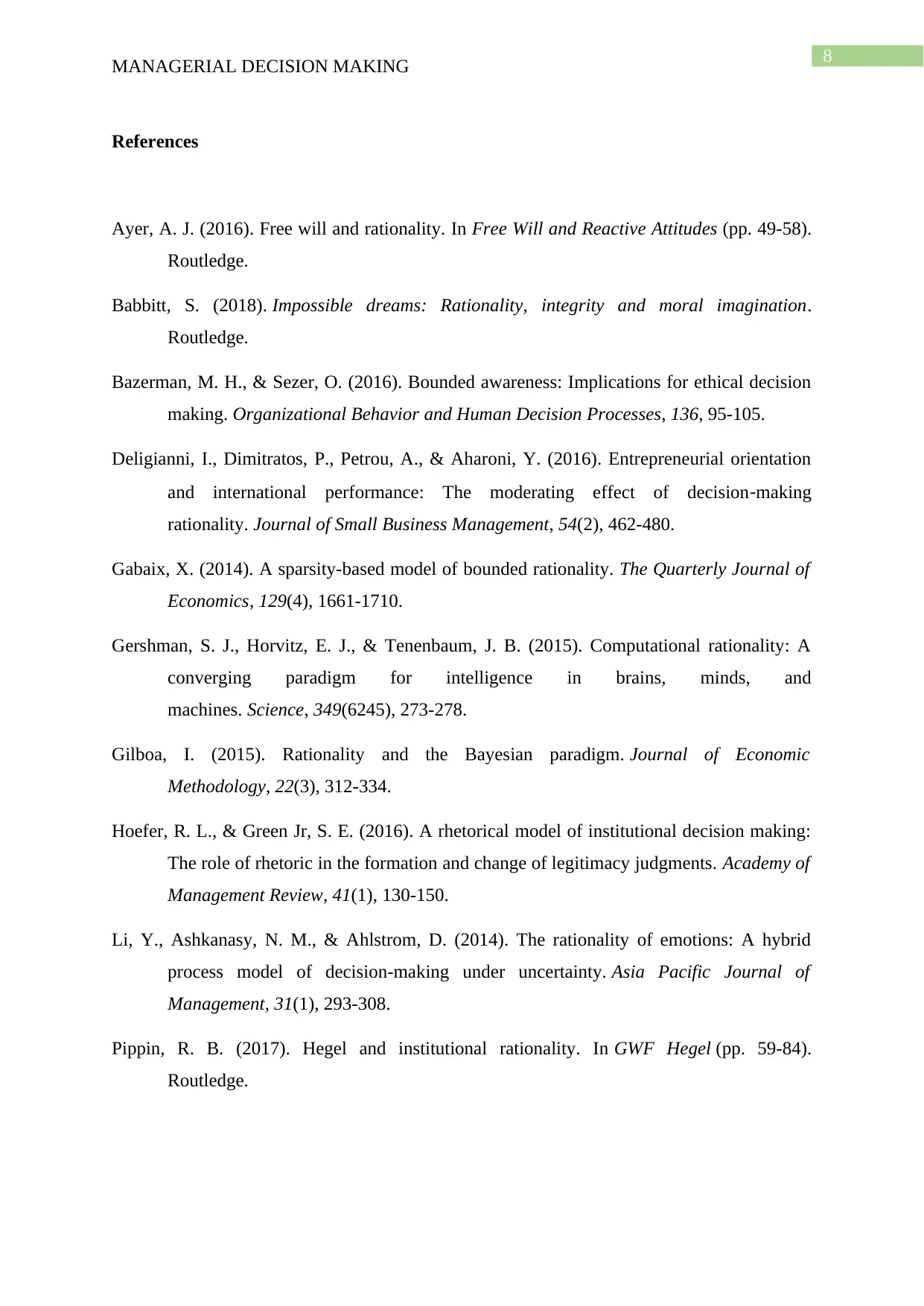
8
MANAGERIAL DECISION MAKING
References
Ayer, A. J. (2016). Free will and rationality. In Free Will and Reactive Attitudes (pp. 49-58).
Routledge.
Babbitt, S. (2018). Impossible dreams: Rationality, integrity and moral imagination.
Routledge.
Bazerman, M. H., & Sezer, O. (2016). Bounded awareness: Implications for ethical decision
making. Organizational Behavior and Human Decision Processes, 136, 95-105.
Deligianni, I., Dimitratos, P., Petrou, A., & Aharoni, Y. (2016). Entrepreneurial orientation
and international performance: The moderating effect of decision‐making
rationality. Journal of Small Business Management, 54(2), 462-480.
Gabaix, X. (2014). A sparsity-based model of bounded rationality. The Quarterly Journal of
Economics, 129(4), 1661-1710.
Gershman, S. J., Horvitz, E. J., & Tenenbaum, J. B. (2015). Computational rationality: A
converging paradigm for intelligence in brains, minds, and
machines. Science, 349(6245), 273-278.
Gilboa, I. (2015). Rationality and the Bayesian paradigm. Journal of Economic
Methodology, 22(3), 312-334.
Hoefer, R. L., & Green Jr, S. E. (2016). A rhetorical model of institutional decision making:
The role of rhetoric in the formation and change of legitimacy judgments. Academy of
Management Review, 41(1), 130-150.
Li, Y., Ashkanasy, N. M., & Ahlstrom, D. (2014). The rationality of emotions: A hybrid
process model of decision-making under uncertainty. Asia Pacific Journal of
Management, 31(1), 293-308.
Pippin, R. B. (2017). Hegel and institutional rationality. In GWF Hegel (pp. 59-84).
Routledge.
MANAGERIAL DECISION MAKING
References
Ayer, A. J. (2016). Free will and rationality. In Free Will and Reactive Attitudes (pp. 49-58).
Routledge.
Babbitt, S. (2018). Impossible dreams: Rationality, integrity and moral imagination.
Routledge.
Bazerman, M. H., & Sezer, O. (2016). Bounded awareness: Implications for ethical decision
making. Organizational Behavior and Human Decision Processes, 136, 95-105.
Deligianni, I., Dimitratos, P., Petrou, A., & Aharoni, Y. (2016). Entrepreneurial orientation
and international performance: The moderating effect of decision‐making
rationality. Journal of Small Business Management, 54(2), 462-480.
Gabaix, X. (2014). A sparsity-based model of bounded rationality. The Quarterly Journal of
Economics, 129(4), 1661-1710.
Gershman, S. J., Horvitz, E. J., & Tenenbaum, J. B. (2015). Computational rationality: A
converging paradigm for intelligence in brains, minds, and
machines. Science, 349(6245), 273-278.
Gilboa, I. (2015). Rationality and the Bayesian paradigm. Journal of Economic
Methodology, 22(3), 312-334.
Hoefer, R. L., & Green Jr, S. E. (2016). A rhetorical model of institutional decision making:
The role of rhetoric in the formation and change of legitimacy judgments. Academy of
Management Review, 41(1), 130-150.
Li, Y., Ashkanasy, N. M., & Ahlstrom, D. (2014). The rationality of emotions: A hybrid
process model of decision-making under uncertainty. Asia Pacific Journal of
Management, 31(1), 293-308.
Pippin, R. B. (2017). Hegel and institutional rationality. In GWF Hegel (pp. 59-84).
Routledge.
⊘ This is a preview!⊘
Do you want full access?
Subscribe today to unlock all pages.

Trusted by 1+ million students worldwide

9
MANAGERIAL DECISION MAKING
Puranam, P., Stieglitz, N., Osman, M., & Pillutla, M. M. (2015). Modelling bounded
rationality in organizations: Progress and prospects. The Academy of Management
Annals, 9(1), 337-392.
Simon, H. A. (1957). Models of Man Social and Rational, Mathematical Essays on Rational
Human Behavior in a Social Setting. Herbert A. Simon,... J. Wiley and Sons.
MANAGERIAL DECISION MAKING
Puranam, P., Stieglitz, N., Osman, M., & Pillutla, M. M. (2015). Modelling bounded
rationality in organizations: Progress and prospects. The Academy of Management
Annals, 9(1), 337-392.
Simon, H. A. (1957). Models of Man Social and Rational, Mathematical Essays on Rational
Human Behavior in a Social Setting. Herbert A. Simon,... J. Wiley and Sons.
Paraphrase This Document
Need a fresh take? Get an instant paraphrase of this document with our AI Paraphraser
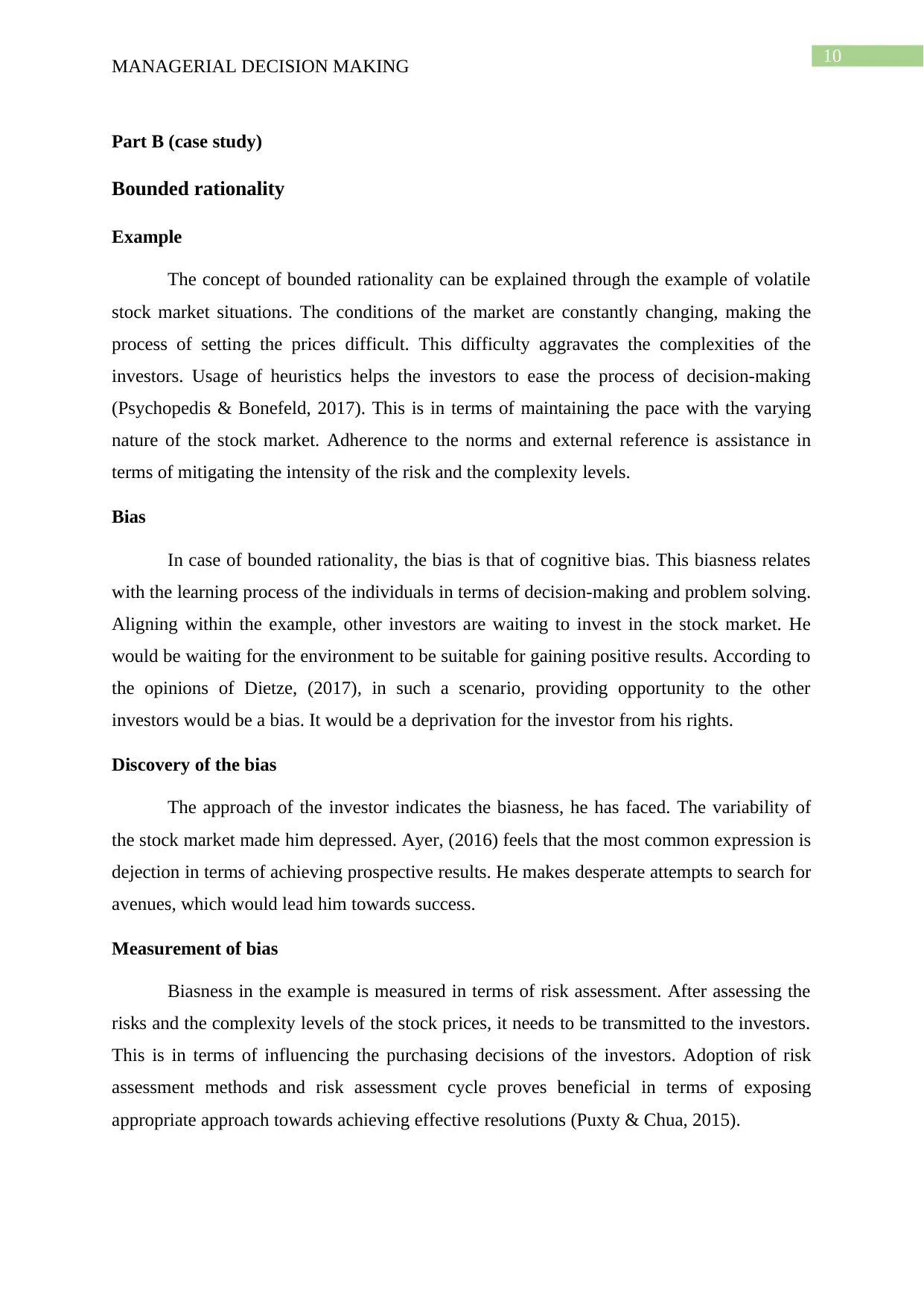
10
MANAGERIAL DECISION MAKING
Part B (case study)
Bounded rationality
Example
The concept of bounded rationality can be explained through the example of volatile
stock market situations. The conditions of the market are constantly changing, making the
process of setting the prices difficult. This difficulty aggravates the complexities of the
investors. Usage of heuristics helps the investors to ease the process of decision-making
(Psychopedis & Bonefeld, 2017). This is in terms of maintaining the pace with the varying
nature of the stock market. Adherence to the norms and external reference is assistance in
terms of mitigating the intensity of the risk and the complexity levels.
Bias
In case of bounded rationality, the bias is that of cognitive bias. This biasness relates
with the learning process of the individuals in terms of decision-making and problem solving.
Aligning within the example, other investors are waiting to invest in the stock market. He
would be waiting for the environment to be suitable for gaining positive results. According to
the opinions of Dietze, (2017), in such a scenario, providing opportunity to the other
investors would be a bias. It would be a deprivation for the investor from his rights.
Discovery of the bias
The approach of the investor indicates the biasness, he has faced. The variability of
the stock market made him depressed. Ayer, (2016) feels that the most common expression is
dejection in terms of achieving prospective results. He makes desperate attempts to search for
avenues, which would lead him towards success.
Measurement of bias
Biasness in the example is measured in terms of risk assessment. After assessing the
risks and the complexity levels of the stock prices, it needs to be transmitted to the investors.
This is in terms of influencing the purchasing decisions of the investors. Adoption of risk
assessment methods and risk assessment cycle proves beneficial in terms of exposing
appropriate approach towards achieving effective resolutions (Puxty & Chua, 2015).
MANAGERIAL DECISION MAKING
Part B (case study)
Bounded rationality
Example
The concept of bounded rationality can be explained through the example of volatile
stock market situations. The conditions of the market are constantly changing, making the
process of setting the prices difficult. This difficulty aggravates the complexities of the
investors. Usage of heuristics helps the investors to ease the process of decision-making
(Psychopedis & Bonefeld, 2017). This is in terms of maintaining the pace with the varying
nature of the stock market. Adherence to the norms and external reference is assistance in
terms of mitigating the intensity of the risk and the complexity levels.
Bias
In case of bounded rationality, the bias is that of cognitive bias. This biasness relates
with the learning process of the individuals in terms of decision-making and problem solving.
Aligning within the example, other investors are waiting to invest in the stock market. He
would be waiting for the environment to be suitable for gaining positive results. According to
the opinions of Dietze, (2017), in such a scenario, providing opportunity to the other
investors would be a bias. It would be a deprivation for the investor from his rights.
Discovery of the bias
The approach of the investor indicates the biasness, he has faced. The variability of
the stock market made him depressed. Ayer, (2016) feels that the most common expression is
dejection in terms of achieving prospective results. He makes desperate attempts to search for
avenues, which would lead him towards success.
Measurement of bias
Biasness in the example is measured in terms of risk assessment. After assessing the
risks and the complexity levels of the stock prices, it needs to be transmitted to the investors.
This is in terms of influencing the purchasing decisions of the investors. Adoption of risk
assessment methods and risk assessment cycle proves beneficial in terms of exposing
appropriate approach towards achieving effective resolutions (Puxty & Chua, 2015).
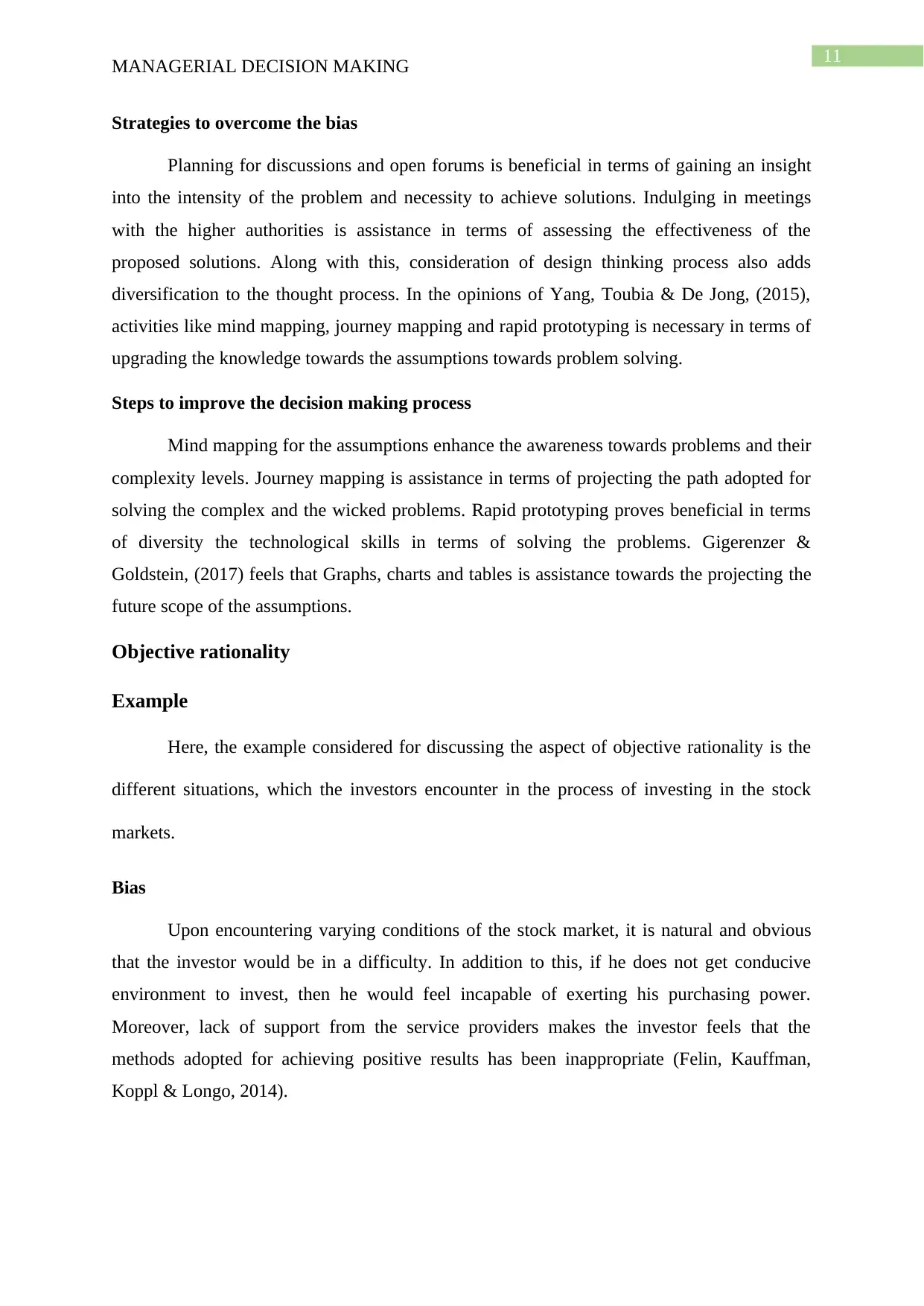
11
MANAGERIAL DECISION MAKING
Strategies to overcome the bias
Planning for discussions and open forums is beneficial in terms of gaining an insight
into the intensity of the problem and necessity to achieve solutions. Indulging in meetings
with the higher authorities is assistance in terms of assessing the effectiveness of the
proposed solutions. Along with this, consideration of design thinking process also adds
diversification to the thought process. In the opinions of Yang, Toubia & De Jong, (2015),
activities like mind mapping, journey mapping and rapid prototyping is necessary in terms of
upgrading the knowledge towards the assumptions towards problem solving.
Steps to improve the decision making process
Mind mapping for the assumptions enhance the awareness towards problems and their
complexity levels. Journey mapping is assistance in terms of projecting the path adopted for
solving the complex and the wicked problems. Rapid prototyping proves beneficial in terms
of diversity the technological skills in terms of solving the problems. Gigerenzer &
Goldstein, (2017) feels that Graphs, charts and tables is assistance towards the projecting the
future scope of the assumptions.
Objective rationality
Example
Here, the example considered for discussing the aspect of objective rationality is the
different situations, which the investors encounter in the process of investing in the stock
markets.
Bias
Upon encountering varying conditions of the stock market, it is natural and obvious
that the investor would be in a difficulty. In addition to this, if he does not get conducive
environment to invest, then he would feel incapable of exerting his purchasing power.
Moreover, lack of support from the service providers makes the investor feels that the
methods adopted for achieving positive results has been inappropriate (Felin, Kauffman,
Koppl & Longo, 2014).
MANAGERIAL DECISION MAKING
Strategies to overcome the bias
Planning for discussions and open forums is beneficial in terms of gaining an insight
into the intensity of the problem and necessity to achieve solutions. Indulging in meetings
with the higher authorities is assistance in terms of assessing the effectiveness of the
proposed solutions. Along with this, consideration of design thinking process also adds
diversification to the thought process. In the opinions of Yang, Toubia & De Jong, (2015),
activities like mind mapping, journey mapping and rapid prototyping is necessary in terms of
upgrading the knowledge towards the assumptions towards problem solving.
Steps to improve the decision making process
Mind mapping for the assumptions enhance the awareness towards problems and their
complexity levels. Journey mapping is assistance in terms of projecting the path adopted for
solving the complex and the wicked problems. Rapid prototyping proves beneficial in terms
of diversity the technological skills in terms of solving the problems. Gigerenzer &
Goldstein, (2017) feels that Graphs, charts and tables is assistance towards the projecting the
future scope of the assumptions.
Objective rationality
Example
Here, the example considered for discussing the aspect of objective rationality is the
different situations, which the investors encounter in the process of investing in the stock
markets.
Bias
Upon encountering varying conditions of the stock market, it is natural and obvious
that the investor would be in a difficulty. In addition to this, if he does not get conducive
environment to invest, then he would feel incapable of exerting his purchasing power.
Moreover, lack of support from the service providers makes the investor feels that the
methods adopted for achieving positive results has been inappropriate (Felin, Kauffman,
Koppl & Longo, 2014).
⊘ This is a preview!⊘
Do you want full access?
Subscribe today to unlock all pages.

Trusted by 1+ million students worldwide
1 out of 17
Related Documents
Your All-in-One AI-Powered Toolkit for Academic Success.
+13062052269
info@desklib.com
Available 24*7 on WhatsApp / Email
![[object Object]](/_next/static/media/star-bottom.7253800d.svg)
Unlock your academic potential
Copyright © 2020–2026 A2Z Services. All Rights Reserved. Developed and managed by ZUCOL.





